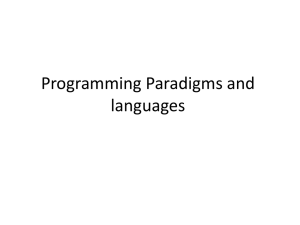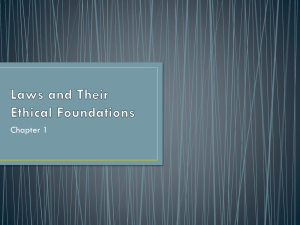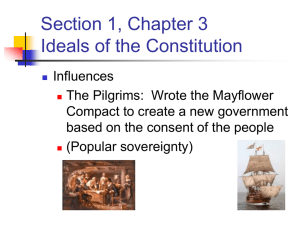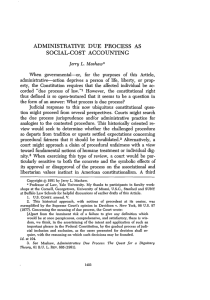sources of procedural law
advertisement
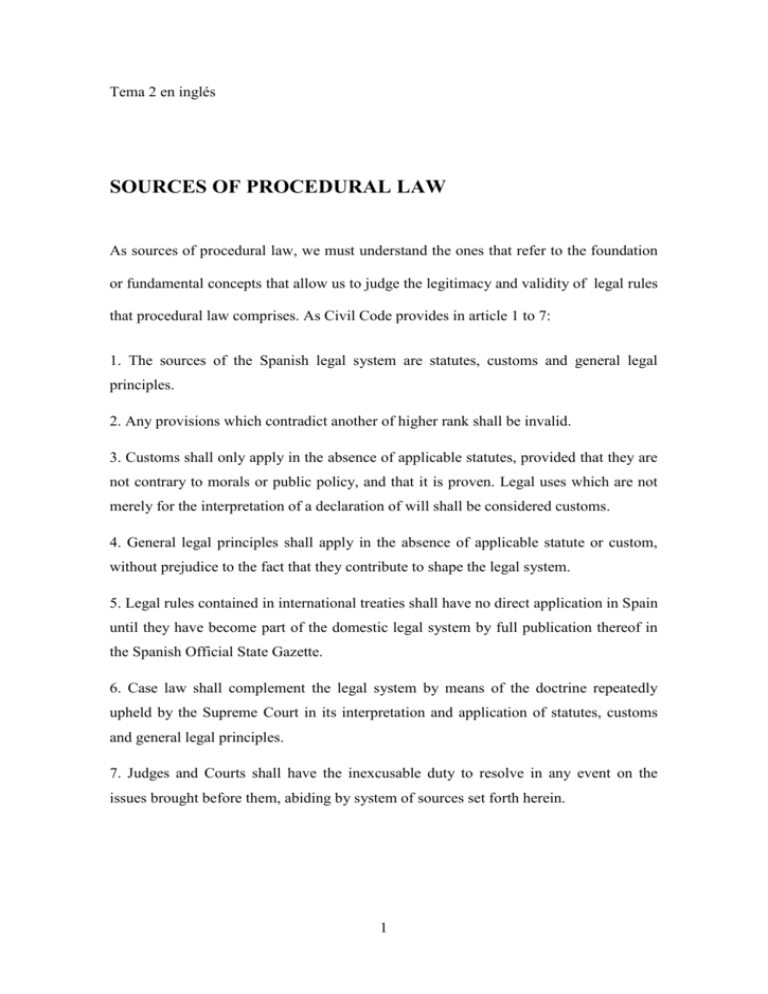
Tema 2 en inglés SOURCES OF PROCEDURAL LAW As sources of procedural law, we must understand the ones that refer to the foundation or fundamental concepts that allow us to judge the legitimacy and validity of legal rules that procedural law comprises. As Civil Code provides in article 1 to 7: 1. The sources of the Spanish legal system are statutes, customs and general legal principles. 2. Any provisions which contradict another of higher rank shall be invalid. 3. Customs shall only apply in the absence of applicable statutes, provided that they are not contrary to morals or public policy, and that it is proven. Legal uses which are not merely for the interpretation of a declaration of will shall be considered customs. 4. General legal principles shall apply in the absence of applicable statute or custom, without prejudice to the fact that they contribute to shape the legal system. 5. Legal rules contained in international treaties shall have no direct application in Spain until they have become part of the domestic legal system by full publication thereof in the Spanish Official State Gazette. 6. Case law shall complement the legal system by means of the doctrine repeatedly upheld by the Supreme Court in its interpretation and application of statutes, customs and general legal principles. 7. Judges and Courts shall have the inexcusable duty to resolve in any event on the issues brought before them, abiding by system of sources set forth herein. 1 As we have seen before, procedural rules differ from substantive rules. Procedural law is instrumental from substantive law, but at the same time is also autonomous. If we have in mind the application of procedural rules in time and it territorial scope, the way both laws are applied differ from each other. Statutes: Above all, the main source of procedural law is the Spanish Constitution. Article 5.1 of Organic Law of Judicial Power states that our Constitution is the supreme law and judges are bound in their judicial function by their provisions. Thus, Spanish Constitution is the first source of law, and regulates, for example, fundamental rights and the right to access to Justice: (“Every person has the right to obtain the effective protection of the Judges and the Courts in the exercise of his or her legitimate rights and interests, and in no case may he go undefended”). Along with the Spanish Constitution we can find the Organic Law of Judicial Power (LOPJ), the Code of Civil Procedure (LEC), The Criminal Procedure Code (LECrim), etc. Custom Custom is never a source of procedural law. As we have learnt before, procedural law rules are of public nature, and based on the principle of procedural legality. The judicial process is conducted by legal rules that shall be followed and enforced by judges and parties. In relation to substantive law, however, is possible that custom can be a source of law. In Spain we have, as example, el derecho foral (Navarra) that differs from the Civil Law, but it never happens in the other way: custom could never be a source of procedural law. 2 General Principles As Professor Asencio states, legal theorists strongly believe that general principles accepted by the Law, especially by our Constitution and by the jurisprudence are the third source of procedural law. In addition, Professor De la Oliva, states that, by the fact that they are contemplated in our Constitution some of those principles become a fundamental rights, as for example, the presumption of innocence. Amongst other general principles, Professor De la Oliva distinguishes between those of them which constitutes elemental (basic) postulates of Justice, of necessary application, and understood as universal principles, as for example the right to be heard (principio de audiencia), and others that are historic criteria, as for example, the dispositive principle1. The first set of principles mentioned by Professor De la Oliva are to be understood as source of Procedural law, and even more, as principles above the statutes and the Constitution. The author considers that their importance is paramount and even without constitutional recognition, they would be above Law and in the end those principles would reform the constitution if they were not recognized in that supreme law. Having this statement as a point of reference, Professor Asencio states that some principles are consubstantial to condition and human relationship and transcend from one human civilization and culture to another, and they must be respected without modification by legislative power. 1 According to this principle, the court will not start or hear a case without the request of the interested party, or satisfy calims in greater extent tan requested; the interested party may terminate the case at any time. 3 Case Law Case law issued by the Supreme Court is a complementary source of interpretation and application of the law. The Supreme Court is allowed to decide not only if the decisions are against the law, but also, if judicial decisions of the lower courts were against the established jurisprudence. The decisions of a court may be appealed if they don’t confirm (are not in the conformity with) the case law decided by the Supreme Court on the same issue in at least two judgments. What usually happen is that the law regulates human relationships and actions in a general way, equally for all citizens. And that results in a situation where judicial interpretation, in applying the law to the current case, tends to be the same, or at least in similar terms. However, this jurisprudence is not binding and, what is more, could be changing. That is the reason why case law is not a source of law. The only binding jurisprudence is issued by the Constitutional Court in relation to the cases that judges unconstitutional issues. 4 5



